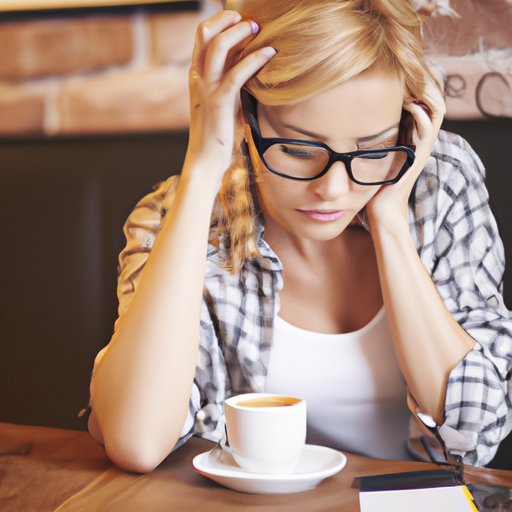
Can Too Much Caffeine Make You Tired?
Do you ever feel like you’re relying on caffeine to keep you awake, only to end up feeling even more tired? It’s a frustrating experience that many of us have encountered. Caffeine is supposed to be a stimulant that boosts alertness and helps us stay awake, so why does it sometimes seem to have the opposite effect? In this article, we’ll explore the paradoxical effect of caffeine, the link between caffeine overload and fatigue, and what you can do to avoid tiredness caused by excessive caffeine consumption.
The Paradoxical Effect: How Too Much Caffeine Can Actually Make You Tired
Caffeine works by blocking adenosine receptors in the brain. Adenosine is a naturally occurring chemical that builds up in the brain throughout the day and promotes sleepiness. By blocking adenosine receptors, caffeine prevents the brain from realizing how tired it really is.
However, when you consume too much caffeine, the opposite effect occurs. The brain becomes overloaded with caffeine and responds by creating more adenosine receptors. This means that the caffeine no longer blocks as many receptors, and the adenosine is able to build up, leading to feelings of tiredness and fatigue.
Caffeine also impacts the quality of sleep you get. If you consume caffeine late in the day, it can delay your body’s internal clock and interfere with the natural release of melatonin, a hormone that promotes sleep. This can lead to difficulty falling asleep and a decrease in the quality of your sleep overall.
Uncovering the Truth: The Link Between Caffeine Overload and Fatigue
So how much caffeine is too much? The answer varies from person to person, but generally, consuming more than 400 milligrams of caffeine per day can lead to negative side effects such as anxiety, jitters, and fatigue.
There are many sources of caffeine beyond just coffee, including tea, soda, energy drinks, and even some medications. It’s important to be aware of how much caffeine you’re consuming on a daily basis and to read labels carefully to ensure you’re not unknowingly consuming excessive amounts of caffeine.
If you do consume too much caffeine, you may experience symptoms such as restlessness, rapid heartbeat, headache, and nausea. In severe cases, caffeine overdose can even lead to seizures or death.
Caffeine Crash: Understanding the Causes and Solutions
Another negative effect of excessive caffeine consumption is the caffeine crash. This is when the caffeine wears off and you experience a sudden drop in energy levels.
Caffeine crashes are caused by the same mechanisms that lead to the paradoxical effect of caffeine. When the caffeine wears off, the newly created adenosine receptors are suddenly unblocked, leading to a rush of adenosine that can make you feel tired and lethargic.
If you experience a caffeine crash, you may feel symptoms such as headache, fatigue, irritability, and difficulty concentrating. To overcome a caffeine crash, try taking a short nap, doing some light exercise, or consuming a small amount of caffeine.
The Dark Side of Picking Up Your Energy with Caffeine: When It Leads to Exhaustion
Long-term excessive caffeine consumption can lead to negative health effects beyond just fatigue. Studies have found that excessive caffeine intake can increase the risk of conditions such as high blood pressure, acid reflux, and osteoporosis.
Caffeine can also disrupt your sleep patterns, leading to chronic fatigue and exhaustion. If you consume caffeine too late in the day, it can stay in your system for hours and interfere with your ability to fall asleep or stay asleep throughout the night.
Excessive caffeine consumption can also lead to burnout or adrenal fatigue. This is when the adrenal glands become overworked and unable to produce hormones necessary for maintaining wakefulness and energy.
Breaking the Cycle: Tips on Avoiding Tiredness from Excessive Caffeine Consumption
The key to avoiding tiredness caused by excessive caffeine consumption is moderation. The recommended daily caffeine intake is about 400 milligrams, which is equivalent to about 4 cups of coffee.
There are also alternatives to caffeine for boosting energy, such as exercising, taking a nap, or consuming foods high in protein and complex carbohydrates. Stepping outside for some fresh air and sunlight can also boost alertness and energy levels.
Other tips for avoiding the negative effects of caffeine include not consuming caffeine too late in the day, drinking enough water to stay hydrated, and avoiding sugary or processed foods that can lead to energy crashes.
Conclusion
In conclusion, while caffeine can be a helpful tool for staying awake and boosting energy levels, it’s important to be mindful of how much you consume and when you consume it. The paradoxical effect of caffeine can actually lead to feelings of tiredness and fatigue, and excessive caffeine consumption can have negative long-term effects on your health and well-being.
To avoid tiredness from excessive caffeine consumption, try moderating your intake, exploring alternative sources of energy, and implementing other healthy lifestyle habits. By practicing moderation and balancing caffeine consumption with other strategies for promoting wakefulness and energy, you can enjoy the benefits of caffeine without experiencing the negative effects.





